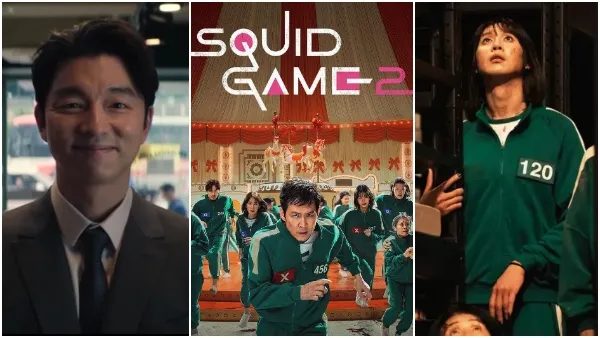Published: December 27, 2024
The second season of Netflix’s global sensation, “Squid Game,” has concluded with a finale that has left audiences worldwide in shock and anticipation. Building upon the intense narrative of the first season, Season 2 delves deeper into the dark recesses of human nature, desperation, and the corrupting influence of power and wealth. The finale not only provides closure to several character arcs but also sets the stage for the forthcoming third season, slated for release in 2025.
Gi-hun’s Return: A Mission to Dismantle the Game
Seong Gi-hun, portrayed by Lee Jung-jae, returns as the central character in Season 2. Haunted by the traumatic events of the first season and driven by a desire to end the inhumane games, Gi-hun infiltrates the competition with a singular goal: to dismantle it from within. His journey is fraught with moral dilemmas, alliances, and betrayals, reflecting the complexities of human nature when confronted with life-and-death situations.
The Rebellion: A Desperate Bid for Freedom
A significant portion of the finale centers on Gi-hun’s attempt to incite a rebellion among the players. Recognizing the futility of individual efforts against the game’s orchestrators, he rallies a group of contestants, including his childhood friend Park Jung-bae (Player 390), to challenge the system. Their plan involves a coordinated attack on the guards, aiming to expose the game’s operations and bring them to a halt.
Betrayal from Within: The Front Man’s Deception
Unbeknownst to Gi-hun, the enigmatic Front Man, Hwang In-ho, has infiltrated the games disguised as Player 001. His presence serves as a strategic move to monitor and sabotage any subversive activities. In-ho’s deception is a pivotal plot twist, culminating in a heart-wrenching betrayal that leads to the failure of the rebellion and the tragic death of Jung-bae. This development underscores the pervasive reach and control of the game’s organizers, as well as the personal conflicts that drive the narrative forward.
The Cliffhanger: Setting the Stage for Season 3
The finale concludes with a dramatic cliffhanger, leaving Gi-hun captured and despondent over the loss of his friend and the collapse of their insurrection. A post-credits scene introduces a new character, Cheol-su, hinted to be associated with Young-hee, the animatronic doll from the first season’s “Red Light, Green Light” game. This teaser suggests the introduction of new and potentially more perilous games in the upcoming season, expanding the series’ universe and deepening the intrigue.
Character Dynamics: Evolution and Impact
The second season delves deeper into character development, exploring the psychological and emotional transformations of key players:
- Seong Gi-hun: His evolution from a traumatized survivor to a determined insurgent highlights his resilience and moral conviction. However, the failure of the rebellion and the loss of Jung-bae leave him in a state of despair, questioning the efficacy of his actions and the possibility of dismantling the system.
- Hwang In-ho (The Front Man): His complex motivations are further explored, revealing a character torn between his role as the game’s overseer and his personal connections. His betrayal of Gi-hun and the rebels adds layers to his enigmatic persona, setting up potential conflicts in the forthcoming season.
- Park Jung-bae: As Gi-hun’s childhood friend, Jung-bae’s involvement in the rebellion adds an emotional depth to the narrative. His death serves as a catalyst for Gi-hun’s character development, intensifying his resolve to end the games.
Thematic Exploration: Power, Desperation, and Human Nature
Season 2 continues to explore themes of power dynamics, human desperation, and the moral ambiguities inherent in survival situations. The introduction of mechanisms allowing players to vote after each game adds a layer of psychological complexity, highlighting the conflicts between self-preservation and collective action. The season also critiques societal structures, emphasizing how systemic corruption and exploitation perpetuate cycles of violence and despair.
Critical Reception and Cultural Impact
Since its release, “Squid Game” Season 2 has garnered significant attention, sparking discussions on social media and among critics. The series’ portrayal of societal issues through the lens of a dystopian game continues to resonate with audiences globally, reflecting real-world economic disparities and moral dilemmas. The cliffhanger ending has heightened anticipation for the third season, with fans speculating on potential plot developments and character arcs.
Looking Ahead: Expectations for Season 3
With the third and final season confirmed for release in 2025, viewers are eager to see how the narrative will conclude. Key questions linger: Will Gi-hun succeed in dismantling the games? What are the true motivations of the Front Man? How will the introduction of new characters like Cheol-su influence the storyline? The upcoming season promises to address these queries, potentially delivering a conclusion that challenges viewers’ perceptions and provokes deeper reflections on the series’ underlying themes.
Conclusion
“Squid Game” Season 2 delivers a compelling continuation of the series, blending intense action with profound thematic explorations. The finale’s shocking twists and unresolved plotlines set the stage for a climactic third season, ensuring that the series remains a focal point of cultural discourse. As audiences await the next installment, the impact of “Squid Game” on global entertainment and its reflection of societal issues continue to be subjects of analysis and discussion.



